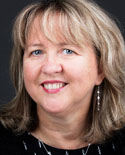|
|
|
|
|
|
|
|
|
A PCP APPROACH TO CONFLICT RESOLUTION IN LEARNING COMMUNITIES
|
|
|
Ann-Louise Davidson *, Nadia Naffi *, Carole Raby **
|
|
|
* Concordia University, Montreal, Canada,
** Université du Québec à Montréal, Canada |
|
|
|
|
|
|
Abstract
Over the past three years, we have been
developing learning communities (LCs) with teachers and other school personnel.
The objective of these LCs is to improve school success and student perseverance.
We took a grassroots perspective to develop a pedagogical leaders LC with the purpose
of generating specific LCs between schools. This involved determining
priorities, identifying strengths, interests and ambitions collectively. The
process generated a significant amount of tensions, especially when
participants had opposite visions and perspectives. This paper describes the
emergence of conflict and discusses how we used Personal Construct Psychology (PCP)
to allow the constructs that underlie these tensions to emerge and turn them
into engines of development for LCs.
Keywords: Repertory grid test, PCP, learning communities,
principals, teachers, school personnel, group work, conflict
|
|
|
|
|
|
|
|
About the authors
|
|
|
 Ann-Louise Davidson is an Associate Professor in the
Educational Technology Program in the Department of Education at Concordia University.
Prior to joining Concordia University, Dr. Davidson served as postdoctoral
fellow at Carleton University and she taught in public and private elementary
and secondary schools. She holds her degrees from the University of Ottawa. Dr.
Davidson’s research revolves around developing learning communities with school
personnel, using innovative pedagogies, such as problem-based learning, to
improve student learning, and maker culture in a perspective of social
innovation. She has expertise in collaborative action-research and in using techniques
for inquiring into action, developing consensus, moving forward with practices
and evaluating impact. Ann-Louise Davidson is an Associate Professor in the
Educational Technology Program in the Department of Education at Concordia University.
Prior to joining Concordia University, Dr. Davidson served as postdoctoral
fellow at Carleton University and she taught in public and private elementary
and secondary schools. She holds her degrees from the University of Ottawa. Dr.
Davidson’s research revolves around developing learning communities with school
personnel, using innovative pedagogies, such as problem-based learning, to
improve student learning, and maker culture in a perspective of social
innovation. She has expertise in collaborative action-research and in using techniques
for inquiring into action, developing consensus, moving forward with practices
and evaluating impact.
Contact: ann-louise.davidson@concordia.ca

Nadia Naffi is a PhD candidate
in education (with a focus on educational technology) at Concordia University
in Montreal. Her research focuses on how youth construe inclusive and exclusive
interactions in online transnational environments in regards to the Syrian
refugees’ crisis and on how this construal explains their offline inclusive or
exclusive processes. She is also a part-time teaching faculty at University of
Ontario Institute of Technology (UOIT), a performance consultant, an
instructional designer and a consultant in the development of online courses,
with over twenty years of experience working in educational settings. She
specializes in the design of synchronous and asynchronous training and
interactive learning in a problem-based learning approach.
Contact: nadianaffi@gmail.com
 Dr. Carole Raby is a full professor in general didactics in the Département
de didactique at Université du Québec à Montréals.She is a member of the Centre de recherche interuniversitaire sur la formation et la
profession enseignante (CRIFPE). Her research interests are focused on the
pedagogical integration of technologies, as well as teachers’ professional
development. She has been conducting a number of action-research projects with
different school boards on integration of technology, namely the collaborative
use of interactive whiteboard by young children. She is also interested in the
potential and evolution of learning communities as a mean to foster professional
development in schools. Dr. Carole Raby is a full professor in general didactics in the Département
de didactique at Université du Québec à Montréals.She is a member of the Centre de recherche interuniversitaire sur la formation et la
profession enseignante (CRIFPE). Her research interests are focused on the
pedagogical integration of technologies, as well as teachers’ professional
development. She has been conducting a number of action-research projects with
different school boards on integration of technology, namely the collaborative
use of interactive whiteboard by young children. She is also interested in the
potential and evolution of learning communities as a mean to foster professional
development in schools.
Contact: raby.carole@uquam.ca
|
|
|
|
|
|
Davidson, A.-L., Naffi, N., Raby, C.(2017). A PCP approach to conflict resolution in learning communities.
Personal Construct Theory & Practice, 14, 61-72, 2017
(Retrieved from http://www.pcp-net.org/journal/pctp17/davidson17.pdf)
|
|
|
|
|
|